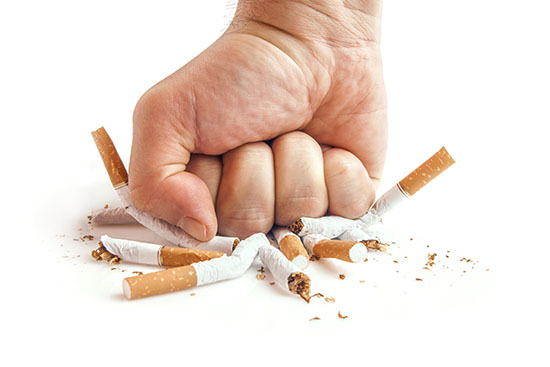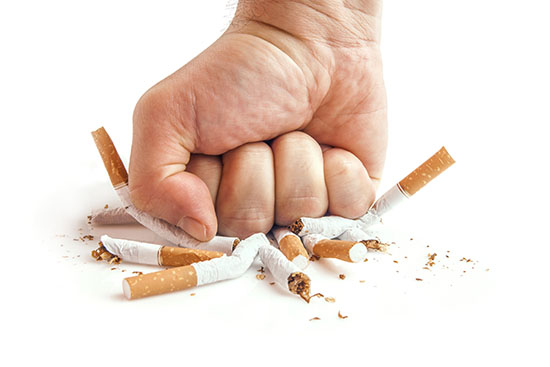Quitting Smoking? Acupuncture Can Help
Many former smokers will tell you that quitting smoking was one of the hardest things that they’ve ever done. Nicotine is incredibly addicting, and whether you smoke cigarettes, cigars, or chew tobacco, quitting is hard. Furthermore, the cravings for tobacco can last for a long time after you quit. For that reason, it can take one or more attempts at quitting to finally give up tobacco for good.
Health Risks Associated with Smoking
Almost every smoker is aware of the risks associated with smoking. They may have seen ads on TV, warnings on their cigarette boxes, or heard it from their loved ones. Most know of the increased risk for lung conditions that come with smoking, including asthma, emphysema, chronic obstructive pulmonary disease (COPD), and lung cancer. However, many people don’t know that smoking can raise your risk for a number of health conditions that aren’t related to your lungs. Among them:
- Heart problems. Smoking impairs your circulation and can damage your heart. It can increase your risk for heart disease, vessel damage, blood clots, and heart attacks.
- Your brain. Compromised circulation from smoking raises your risk for stroke and damage to the arteries that send blood to your brain.
- Reproductive health. Smoking increases the risk of impotence, damaged sperm, lower sperm count, and testicular cancer in men. In women, smoking can increase the time it takes to conceive, as well as increase your risk for cervical cancer. During pregnancy, smoking increases the chance of miscarriage, premature birth, and stillbirth.
- Throat and mouth. Damage to your mouth and throat can result from both smoking and chewing tobacco. The health implications include a greater risk for cancer of the esophagus, throat, voice box, lips, and tongue. In addition, tobacco use is unappealing. It stains your teeth, gives you bad breath, can cause gum disease, and dampens your sense of taste.
- Other cancers. Smoking is associated with an increased risk cancer to the stomach, head and neck, esophagus, kidney, and pancreas.
- Your skin. Poor circulation from smoking reduces the amount of oxygen getting to your skin and shows up as accelerated aging and a dull complexion. Increased facial wrinkles from smoking, especially around the eyes and mouth, combined with a sallow complexion, gives smokers the appearance of being older by a decade or more.
Some Good News
Your body is programmed to heal, and that healing begins as soon as you quit smoking. In as little as 12 hours, the carbon monoxide from smoke is out of your body and oxygen levels are back to normal. After about a day, your risk of having a heart attack begins to decrease and your blood pressure starts to drop. Your sense of taste begins to return after two or three days, and after a month of not smoking, your lung function starts to improve with less coughing and shortness of breath. In the months following, your circulation continues to get better and your lungs are significantly healed. After ten years as a non-smoker, your risk of developing certain cancers is significantly reduced, and your lung cancer risk is cut in half. In 15 to 20 years after quitting, your overall health risks are the same as if you never smoked.
The Role of Acupuncture in Quitting
There’s no doubt about it; quitting tobacco is hard, but there’s also help in the form of acupuncture. Researchers have documented that acupuncture can be an effective tool in reducing cigarette use and quitting smoking altogether. They also found that after acupuncture treatments, study participants reported that cigarettes tasted worse and their desire to smoke was reduced. Other studies have concluded that acupuncture can help quitters remain tobacco free for longer, boosting chances of quitting for good.
Your acupuncturist has a number of strategies to help you quit successfully. One technique is through ear acupuncture, which is a protocol specifically targeted at treating addictions. Ear acupuncture uses needles during a treatment, but can be augmented with small beads that are left in your ears to prolong the decreased frequency and intensity of cravings. Your practitioner will also likely include acupuncture on body points to support your lungs, boost overall health, and improve your circulation.
Beyond supporting your health and reducing cravings, acupuncture is also effective in the mental game of quitting. It alters your brain chemistry to decrease stress, which can spike during the process of quitting. Acupuncture boosts the circulation of feel-good endorphins in your brain which helps to elevate your mood, reduce irritability, and enhance sleep.
A good strategy for quitting is to begin by making a commitment to become tobacco-free. Slowly reduce your use over the next few days or weeks, and determine your Quit Day. Book an acupuncture treatment for the day you quit. You’ll likely need follow-up treatments in the early days and weeks after you quit, but as your cravings subside, you’ll be able to taper off to less frequent treatments.
The bottom line is that quitting smoking is hard to do. However, millions of people have done it, and with commitment and some help from your acupuncturist, you can too.

Cindy Chamberlain is an acupuncturist in Overland Park, KS and the founder of Eastern Healing Solutions, LLC. She is licensed in Kansas and Missouri and has been practicing traditional Chinese medicine since 1996.



